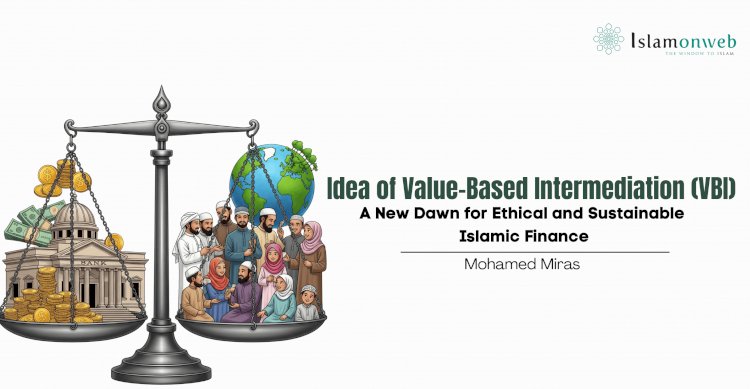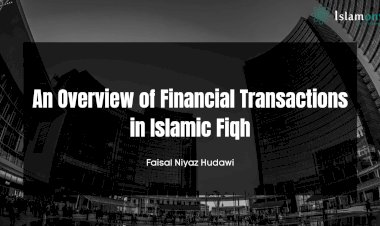Idea of Value-Based Intermediation (VBI): A New Dawn for Ethical and Sustainable Islamic Finance
In 2018, Bank Negara Malaysia (the Bank), in collaboration with the founding members of the VBI Community of Practitioners, presented a strategy paper on the Value-Based Intermediation (VBI) approach in Islamic finance. The aim was to encourage the adoption of practices, offerings, and conduct that generate positive and sustainable impacts on the economy, community, and environment, in line with shareholders’ sustainable returns and long-term interests.
But what exactly is meant by value-based intermediation? What are the key features of VBI? How will it benefit customers, entrepreneurs, the environment, and society at large? Could it mark a revolution in the world of Islamic banking? These are the questions we will explore in this article.
In today’s world, the focus of many entities is gradually shifting from a purely profit-driven motive to one centred on sustainable development. Governments, UN organisations, and large-scale business networks increasingly promote practices aligned with the principles of green finance and the Sustainable Development Goals (SDGs). ESG (Environmental, Social, and Governance) frameworks and ethical investing are examples of such global initiatives.
In response to these movements, the Malaysian government introduced the concept of Value-Based Intermediation, which focuses on developing business platforms that promote ethical governance, equitable wealth distribution, sustainable and eco-friendly projects, while remaining aligned with the principles of Sharīʿah — such as interest-free transactions, the avoidance of gharar (excessive uncertainty), and the prohibition of ḥarām activities including gambling.
The idea of VBI originates from Value-Based Banking (VBB), introduced in 2009 by the Global Alliance for Banking on Values (GABV), an independent network of banks and banking co-operatives that use finance to deliver sustainable development. For VBB to be applied within Islamic banks, it must be integrated with the principles of Sharīʿah. In pursuit of this, Bank Negara Malaysia introduced the concept of VBI in 2017, which shares the same underlying intention as GABV.
Value-Based Intermediation, as defined by Bank Negara in its strategy paper, is:
“An intermediation function that aims to deliver the intended outcomes of Sharīʿah through practices, conduct, and offerings that generate positive and sustainable impact to the economy, community, and environment, consistent with the shareholders’ sustainable returns and long-term interests.”
Bank Negara Malaysia has presented this strategy to all Islamic financial institutions with the aim of unlocking the full potential of Islamic finance. Muhammad (2018), at the 13th International Sharīʿah Scholars Forum, mentioned two key rationales for VBI.
First, the growth of the Islamic banking and finance industry should move beyond profitability alone to encompass the development of the economy (profit), community (people), and environment (planet). Second, the innovation of Islamic financial products should adhere to and be guided by the principles of maqāṣid al-sharīʿah.
Thus, beyond environmental preservation and sustainable practices, VBI seeks a more holistic application of Sharīʿah, ensuring that Islamic banking practices and offerings comply fully with its requirements, in order to achieve the intended outcomes of Sharīʿah, such as justice, equitable wealth circulation, and fair wealth distribution.
Common Underpinning Thrusts of VBI
There are four main underpinning thrusts, or focus areas, of VBI:
- Entrepreneurial Mindset – This is the key focus of VBI, centred on facilitating entrepreneurial activities through financing and proactive support such as advisory services, market infrastructure, and business networking. Entrepreneurial activities hold a special place in Islam, as the Prophet ﷺ once said: “Nine out of ten sources of income come from business activities.”
- Community Empowerment – This thrust aims to empower communities by providing financial solutions that create a positive impact. Since community empowerment is a farḍ kifāyah, VBI promotes community welfare programmes, allocates funds for public health and education, distributes zakat to aṣnāf, and has even served as a helping hand for people affected by COVID-19.
- Good Self-Governance – This relates to cultivating organisational discipline (self-restraint) and ensuring the meaningful participation of all stakeholders within the governance framework. It has two aspects: good governance, which refers to the proactive engagement of stakeholders, and self-governance, which emphasises greater accountability within Islamic banking institutions (IBIs).
- Best Conduct – This thrust focuses on adopting practices that enhance IBIs’ offerings, processes, and treatment of their stakeholders, including customers and employees. The last two thrusts collectively emphasise improving internal conduct and ensuring ethical behaviour at both internal and external levels.
All these thrusts are anchored in five Islamic principles:
- Principle of Islamic Business (Entrepreneurial Management)
- Principle of Social Obligation (Community Empowerment)
- Principle of Righteousness (Good Governance)
- Principle of Istishārah (Self-Governance)
- Principle for Contracting Parties (Best Conduct)
Practices of Value-Based Intermediation
The practices of VBI operate across five key dimensions:
- Impact-Based Assessment – Giving equal attention to an application’s potential impact on society, the environment, and the economy.
- Comprehensive Performance Measurement – Measuring both financial indicators (such as profit and sustainable practices) and non-financial indicators (such as employee satisfaction and community welfare projects).
- Impact-Focused Disclosure – Providing details on the customers to whom they lend or in whom they invest, including the purpose, location, and outcomes of these engagements.
- Constructive Collaboration – Collaborating with a wide range of stakeholders, including those without direct business relationships, such as NGOs, community organisations, and government bodies.
- Inclusive Governance – Actively engaging both traditional and non-traditional stakeholders in the decision-making process.
Does VBI Reinvent the Wheel?
The question remains: Is Value-Based Intermediation (VBI) truly groundbreaking? Not entirely. VBI shares many objectives with ESG, Ethical Finance, and SRI. However, its defining distinction lies in its Sharīʿah foundation, which shapes its values, priorities, and sustainable financial goals. Rooted in the principles of maqāṣid al-sharīʿah — preservation of religion, life, intellect, lineage, and wealth — VBI serves as a practical application of these objectives. Its implementation begins with a Corporate Value Intent (CVI), which guides policies and operations.
VBI also aligns with the UN Sustainable Development Goals through the Triple Bottom Line (3Ps): Profit/Prosperity, People, and Planet, in harmony with the UNEP FI’s Principles for Responsible Banking (PRB).
Islamic banks further reinforce VBI by integrating waqf and ṣadaqah, thereby fostering greater socio-economic impact. It also aligns with CSR principles by considering social, environmental, and economic factors. Additionally, VBI combines Islamic social finance tools such as zakāt, waqf, qarḍ, and kafālah with modern financial instruments including microfinance, ṣukūk, and takāful. This integration ensures Sharīʿah compliance while advancing socio-economic and environmental welfare.
Challenges in the Implementation of Value-Based Intermediation
In the current business landscape, VBI faces several challenges in its broader application. In a 2018 interview, Tan Sri Zarinah Anwar, former Chairman of the Securities Commission Malaysia, acknowledged the difficulty of changing the mindset of company directors and senior management. As outlined in the strategy paper, VBI requires a shift in the attitudes of all bank stakeholders, including the Board of Directors, management, and key staff, towards its principles.
Secondly, it is well-documented in the literature that banks, including Islamic banks, are traditionally profit maximisers. Standard theory holds that a bank’s shareholders are claimants to its profits, making profit maximisation their natural priority. However, VBI calls on industry players to move beyond profit maximisation to creating value for all stakeholders. This was reflected in the theme “Beyond Profit” at the 2018 Global Islamic Finance Forum (GIFF 2018) in Kuala Lumpur, held a year after the launch of the strategy paper by BNM. A survey conducted during the forum revealed that most respondents from Islamic banks still retained a profit-maximisation mindset. Through innovation, however, a sustainable environment can be fostered within Islamic banks.
Finally, VBI is still in its early stages. Compared to the SDG principles, VBI values remain relatively limited in scope. To be effective, VBI must be understood more broadly, with bank staff equipped with sufficient awareness and knowledge of environmental issues such as global warming, acid rain, air pollution, urban sprawl, waste disposal, ozone layer depletion, water and soil pollution, deforestation, carbon footprint reduction, as well as the impact on marine life and public health. VBI principles should evolve to address the full spectrum of environmental and ecological challenges.
Conclusion
In sum, VBI is a true game changer in the world of Islamic finance. It introduces a transformative approach where the focus is balanced between ethical and ecological values, rather than centred solely on profit maximisation. The VBI initiative plays a pivotal role in instilling core values that build trust and deliver benefits to society as a whole.
Islamic banks, by virtue of their natural alignment with the principles of social justice, are ideally positioned to lead this transformation and drive meaningful change. However, the momentum of VBI can only be sustained through collective effort and a genuine shift in mindset and actions across all stakeholders. With strong commitment, the vision of VBI can be realised, paving the way for a more inclusive, responsible, and sustainable future.
About the author:
Mohamed Miras is a Postgraduate Scholar at Darul Huda Islamic University, Chemmad, specialising in Islamic Economics and Finance. Muhammed Miras focuses his research and studies on integrating Islamic financial tools with conventional banking to promote ethical and sustainable finance. Passionate about innovation and community development, finance and business studies.
References
- AIBIM, INCEIF University, & ISRA research management centre (Directors). (2022). Value-Based Intermediation Report 2022
- Dewi, S., Yaswirman, Y., Helmi, H., & Henmaidi, H. (2023). Value Based Intermediation (VBI) as a Sharia Banking Strategy in supporting sustainable development in Indonesia. Al-Kharaj Journal of Islamic Economic and Business, 5(3). https://doi.org/10.24256/kharaj.v5i3.4155
- Hassan, Rusni Binti, and Fatimah Mohamad Nor. "Value-Based Intermediation: An Analysis from the Perspective of Shariah and Its Objectives." International Journal of Fiqh and Usul al-Fiqh Studies 3, no. 1 (2019): 81-89. International Islamic University Malaysia
- Kadir, Aizurra Haidah Abdul, Sharifah Faigah Syed Alwi, Fateha Abd Halim, Norzanah Mat Nor, and Aula Ahmad Hafidh Saiful Fikri. "Realisation of Maqasid Al-Shariah using Value-Based Intermediation in Islamic Banks: Acceptance or Refusal." Management and Accounting Review 23, no. 1 (April 2024): 40-55.
- Ismail, Ahmad Yani, Latifa Bibi Musafar Hameed, Ahmad Fatin Mohamad Suhaimi, Nur Izzati Jamaludin, and Shahida Shahimi. "Value Based Intermediation and Interconnection of Sustainable Development Goals in Islamic Banking Framework." International Journal of Islamic Economics and Finance Research 3, no. 1 (2020): 45-56.
- Value-based intermediation; Strengethening the roles and impact of Islamic Finance. (2018). [Dataset]. In Bank Negara Malaysia [Central bank of Malaysia], Strategy Paper on VBI.
- Ismail, A. Y., Hameed, L. B. M., Suhaimi, A. F. M., Jamaludin, N. I., & Shahimi, S. (2020). Value based intermediation and interconnection of sustainable development goals in Islamic Banking framework. International Journal of Islamic Economics and Finance Research, 3(1), 45–56.
- Ziyad, A. Prof. (n.d.). Value-based Intermediation (VBI). In Social Finance. INCEIF.
Disclaimer
The views expressed in this article are the author’s own and do not necessarily mirror Islamonweb’s editorial stance.
























Leave A Comment